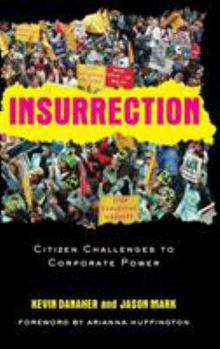Insurrection: Citizen Challenges to Corporate Power
Select Format
Select Condition 
Book Overview
From uncovering major retailers' links to sweatshop abuses and revealing the deception of American tobacco companies, to questioning corporations' ties to repressive dictators, shaming food processors... This description may be from another edition of this product.
Format:Hardcover
Language:English
ISBN:0415946778
ISBN13:9780415946773
Release Date:September 2003
Publisher:Routledge
Length:364 Pages
Weight:1.40 lbs.
Dimensions:1.0" x 6.2" x 9.6"
Related Subjects
Biography & History Business Business & Finance Business & Investing Business Ethics Company Profiles Economic Conditions Economics Education & Reference Ethics Globalization Political Economy Political Science Politics & Government Politics & Social Sciences Popular Economics Social SciencesCustomer Reviews
2 ratings
This book is worth reading!
Published by Thriftbooks.com User , 20 years ago
In 315 breathless pages this book covers the history of US Corporate accountability struggles and the more recent activist battles over sweatshops, dolphin safe tuna, tobacco, Burma, and rule making in the global economy. In every case the book discusses how the campaign looked to the consumer, the activist, and what the lingering impact of it is. Every chapter ends with at least a couple of pages of "lessons learned".Much space is devoted to the topic of Brands. In the chapter on sweatshops Nike gets lots of attention, primarily because everybody is familiar with them, but also because as a Global Brand they have a name to protect. The authors discuss how the activist goal was to put the company in a situation where "all they had to do to rehabilitate their Brand was stop using sweatshops for manufacturing." They acknowledge how it would be much harder to go after the no-name manufacturers with clothes on the same racks, even though their sleaze problems could easily be worse. After reading the book I had a better sense of what a Brand is all about.Another topic that gets a lot of attention is how many of our consumer issues have global implications. In the tuna campaign the activists thought they had a great victory when they got Congress to pass a law against the practices that killed so many dolphins. Unfortunately, the tuna fishermen responded to the law by "offshoring", changing their boat registration so they could fly a foreign flag. Sometimes they didn't even move where they fished or docked, they just did their registration paperwork in Mexico or some more exotic Capital. The tobacco companies responded to the shrinking of the American cigarette market by developing markets overseas. Over and over the idea that we need a coordinated international response to this kind of stuff comes up.The lesson is driven home in spades in the case of Burma. Activists worked to get local jurisdictions to vote to stop doing business with the totalitarian regime in power there, a strategy that had worked well in South Africa's case. They were undermined by international agreements that made such initiatives "illegal barriers to trade". Even so, a lot of companies were talked out of doing business there. The country was forced to hold elections, but the pressure was not great enough that the people elected were actually given power. I could almost see frustrated activists saying "well at least we made something happen".The last case recounted is "The Battle In Seattle", where activists shut down the WTO in the full limelight of all kinds of press. They show how many lessons learned about using the Internet to get the word out in earlier campaigns like the Burma one kept the corporations from fully controlling the spin on the news the way they had in previous eras. The authors consider it a great victory that the previously quiet backwater of international trade negotiations was now promoted to the front page of political debate. Told from the activist poi
People have the power to redeem the work of fools (P. Smith)
Published by Thriftbooks.com User , 20 years ago
You come away from this book feeling that people do make a difference, even though progress often happens at a slower pace than we would like, and success often is followed by backlash. The book is well organized, not as a barrage of information, but as a series of well developed stories that have a common thread. Corporate globalization is presented as the race to the bottom by which capital moves freely to wherever cost is lowest, leading to investment where environmental standards are the most lax and exploitation the most severe. The prescriptions for change are debatable, yet worthy of debate.





